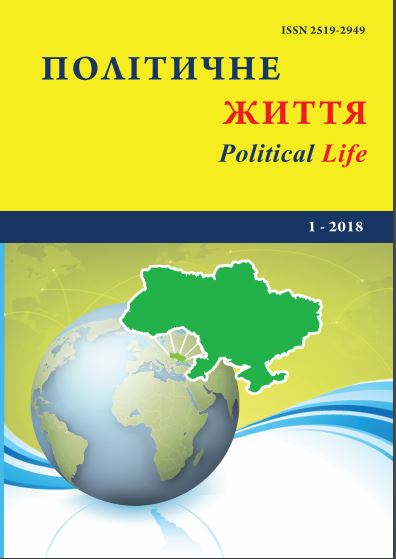A rhetoric of monuments to soldiers-Afghans in Ukraine: the problem of commemoration.
DOI:
https://doi.org/10.31558/2519-2949.2018.1.17Keywords:
war in Afghanistan, Warriors-Afghan, monumental text, monuments, politics of memoryAbstract
Symbolic politics affects on the form of national memory, through that people, as imaginary to nation, become political sense of the state. But the institutional level of politics of memory in the context of the political mode "over-produces" the idea of people and creates new discourse of memory. What can enter into contradictions and carry a destructive force for nation. The representation of war in Afghanistan through monuments, as monumental text, is the example of such a policy.
Memory places are the markers of social groups. When they becomes too much, they cease to be appreciable. They are overlooked. And together with them as well the appreciableness of social groups gets lost. Because, according to J. Assman, memories are defined by the pronoun "we". When the state monopolizes right by heart, domination of collective memory above individual takes place. The mechanism of identity is formed through compulsion to remember.
Mixing of entirely different events in one monumental text is split by the value of each historical event, and combination of two different symbols gives birth to the third. So character is created without sense. And symbol transforms to denoted without designating for the age which still remembers historical events.
Monument, as the code which bears determined message, forms attitude to the history. As artificial sense that it is created due to society, the monument plays a big role in formation of national memory. But the monuments influence and to formation of party unconscious, as they create determined archetypes in the society. Due to them short-term society memory transforms to long-term.
They influence formation of feeling of national unity, advantage, self-esteem. But, together with that, they can form and national injury, threaten to turn to revolutionary mood. Acting by the marker which influences specifications of “one’s” and “strange”, the monument is capable both to unite, and to separate society.
References
Булкина И. Гости из прошлого: новые украинские исследования «политики памяти». Гефтер [Електронний ресурс]. – Режим доступу: http://gefter.ru/archive/23782
ГО «Спілка ветеранів Афганістану (воїнів інтернаціоналістів) та учасників АТО» [Електронний ресурс]. – Режим доступу: http://bezbroni.net/organization/go-spilka-veteraniv-afganistanu-voiniv-internacionalistivta-ucasnikiv-ato
Гриценко О. А. Президенти і пам’ять. Політика пам’яті президентів України (1994 – 2014): підґрунтя, послання, реалізація, результати. – К.: «К.І.С.», 2017. – 1136 с.
Данилова Н. Мемориальная версия Афганской войны (1979 – 1989 годы) / Наталья Данилова // Неприкосновенный запас. – 2005. – №2-3 (40-41) [Електронний ресурс]. – Режим доступу: http://magazines.russ.ru/nz/2005/2/dan17-pr.html
Думская. Под Одессой открыли памятник воинам-интернационалистам и ликвидаторам [Електронний ресурс]. – Режим доступу: http://dumskaya.net/news/pamyatnik_-072047/
Зерній Ю. О. Державна політика пам’яті в Україні: становлення та сучасний стан //Стратегічні пріоритети. – 2008. – №. 3. – С. 41 – 51.
Исток. Информационное агентство. Памятник воинам-интернационалистам открыли в Алчевске [Електронний ресурс]. – Режим доступу: http://miaistok.su/pamyatnik-voinam-internatsionalistam-otkryli-valchevske/
Новини Полтавщини. На Миргородщині відкрили пам’ятний знак ліквідаторам аварії на ЧАЕС та воїнам-інтернаціоналістам [Електронний ресурс]. – Режим доступу: http://np.pl.ua/2016/04/u-seli-klyushnykivkavidkryly-pamyatnyj-znak-likvidatoram-avariji-na-chornobylskij-aes-ta-vojinam-internatsionalistam/
Образ врага / сост. Л. Гудков; ред. Н. Конрадова. – М.: ОГИ, О-23 2005. – 334 с.
Олександрійська міська рада. Офіційний сайт. Продовжується облаштування площі перед міською радою [Електронний ресурс]. – Режим доступу: http://olexrada.gov.ua/news/prodovzhuyetsya-oblashtuvannyaploshhi-pered-miskoyu-radoyu.html
Постанова Кабінету міністрів України від 2 квітня 1993 р. №238. Про сприяння діяльності Української Спілки ветеранів Афганістану [Електронний ресурс]. – Режим доступу: http://zakon3.rada.gov.ua/laws/show/238-93-n
Постанова Кабінету міністрів України від 8 вересня 2004 р. №1181. Деякі питання спорудження (створення) пам’ятників і монументів [Електронний ресурс]. – Режим доступу: http://zakon3.rada.gov.ua/ laws/show/1181-2004-n
Розпорядження Президента України. Про відзначення 10-ї річниці з дня виведення військ колишнього Союзу РСР з Афганістану [Електронний ресурс]. – Режим доступу: http://zakon3.rada.gov.ua/laws/show/549/ 98-рп
Сенявский А. С., Сенявская Е. С. Историческая имагология и проблема формирования «образа врага»(на материалах российской истории XX в.) //Вестник Российского университета дружбы народов. Серия: История России. – 2006. – №. 2 (6). – С. 54 – 72.
Суть времени. Закладка памятника воинам-интернационалистам в Донецке. ТВ СВ-ДНР. Выпуск 406 [Електронний ресурс]. – Режим доступу: https://eot.su/node/18527
Указ Президента України. Про утворення Комітету ветеранів війни в афганістані та воєнних конфліктів в інших зарубіжних країнах [Електронний ресурс]. – Режим доступу: http://zakon3.rada.gov.ua/ laws/show/74/92
Указ Президента України. Про День вшанування учасників бойових дій на території інших держав [Електронний ресурс]. – Режим доступу: http://zakon1.rada.gov.ua/laws/show/180/2004
Українська Спілка ветеранів Афганістану (воїнів-інтернаціоналістів). Конференція української спілки ветеранів Афганістану [Електронний ресурс]. – Режим доступу: http://www.usva.org.ua/mambo3/index.php? option= com_content&task=view&id=5429
Юрчак, А. Это было навсегда, пока не кончилось. Последнее советское по коление / Алексей Юрчак; предисл. А. Беляева; пер. с англ. – М.: Новое литературное обозрение, 2014. –664 с.
Behrends J. C. «Some call us heroes, others call us killers». Experiencing violent spaces: Soviet soldiers in the Afghan War //Nationalities Papers. – 2015. – Т. 43. – №. 5. – С. 719-734.
Kabrońska J. Contemporary Spaces of Memory-Towards Transdisciplinarity in Architecture // IOP Conference Series: Materials Science and Engineering. – IOP Publishing, 2017. – Т. 245. – №. 4. – С. 042034.
Kadykało A., Behrends J. C. The Afghan War (1979-1989) in the Cultural Memory of the Russians //Cultural Analysis. – 2015. – Т. 14. – P. 48 – 85.

